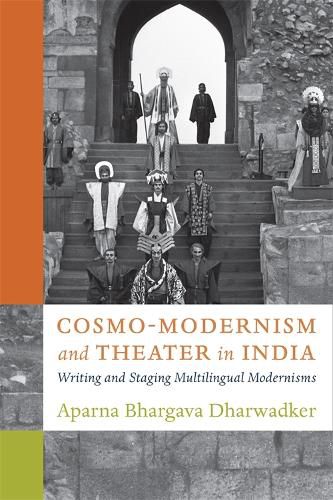Readings Newsletter
Become a Readings Member to make your shopping experience even easier.
Sign in or sign up for free!
You’re not far away from qualifying for FREE standard shipping within Australia
You’ve qualified for FREE standard shipping within Australia
The cart is loading…






Urban theater took shape in postindependence India as a large and complex field produced in more than sixteen major languages, including Bengali, Marathi, Hindi, Gujarati, and Kannada. The cosmopolitan engagement of leading playwrights with modernist and postcolonial literary movements around the world created distinctly new aesthetic and political approaches to Indian myth, history, and sociocultural experience, which had become the most prominent subjects in modern Indian drama. Yet even as critics and scholars of global modernism have increasingly turned their attention beyond North America and Europe, they continue to focus on dominant world languages at the expense of multilingual cultures such as India's. Despite their originality and significance, modernist works written in Indian languages other than English remain neglected.
In Cosmo-Modernism and Theater in India, Aparna Bhargava Dharwadker develops a new framework for understanding non-Anglophone Indian modernisms by recovering crucial theoretical concepts and using them to analyze the writing, staging, and reception of major plays in multiple languages. She argues that the output of prominent mid- to late-twentieth-century playwrights such as Dharamvir Bharati, Mohan Rakesh, Badal Sircar, Vijay Tendulkar, Girish Karnad, and Habib Tanvir registers a decisive rupture from nineteenth-century forms of colonial modernity. In representing the ancient Indian past, the postcolonial urban present, and the rich repertoire of precolonial performance traditions, these authors' works became highly inventive expressions of modernist classicism, realism, and traditionalism. Dharwadker shows how a decommercialized performance economy and the incessant activity of translation further enhanced modernist production, and she connects Indian modernisms to regional, national, and transnational networks. Offering bold new insights into the theory and practice of modernist drama, this book delivers a radical remapping of global modernisms.
$9.00 standard shipping within Australia
FREE standard shipping within Australia for orders over $100.00
Express & International shipping calculated at checkout
Urban theater took shape in postindependence India as a large and complex field produced in more than sixteen major languages, including Bengali, Marathi, Hindi, Gujarati, and Kannada. The cosmopolitan engagement of leading playwrights with modernist and postcolonial literary movements around the world created distinctly new aesthetic and political approaches to Indian myth, history, and sociocultural experience, which had become the most prominent subjects in modern Indian drama. Yet even as critics and scholars of global modernism have increasingly turned their attention beyond North America and Europe, they continue to focus on dominant world languages at the expense of multilingual cultures such as India's. Despite their originality and significance, modernist works written in Indian languages other than English remain neglected.
In Cosmo-Modernism and Theater in India, Aparna Bhargava Dharwadker develops a new framework for understanding non-Anglophone Indian modernisms by recovering crucial theoretical concepts and using them to analyze the writing, staging, and reception of major plays in multiple languages. She argues that the output of prominent mid- to late-twentieth-century playwrights such as Dharamvir Bharati, Mohan Rakesh, Badal Sircar, Vijay Tendulkar, Girish Karnad, and Habib Tanvir registers a decisive rupture from nineteenth-century forms of colonial modernity. In representing the ancient Indian past, the postcolonial urban present, and the rich repertoire of precolonial performance traditions, these authors' works became highly inventive expressions of modernist classicism, realism, and traditionalism. Dharwadker shows how a decommercialized performance economy and the incessant activity of translation further enhanced modernist production, and she connects Indian modernisms to regional, national, and transnational networks. Offering bold new insights into the theory and practice of modernist drama, this book delivers a radical remapping of global modernisms.